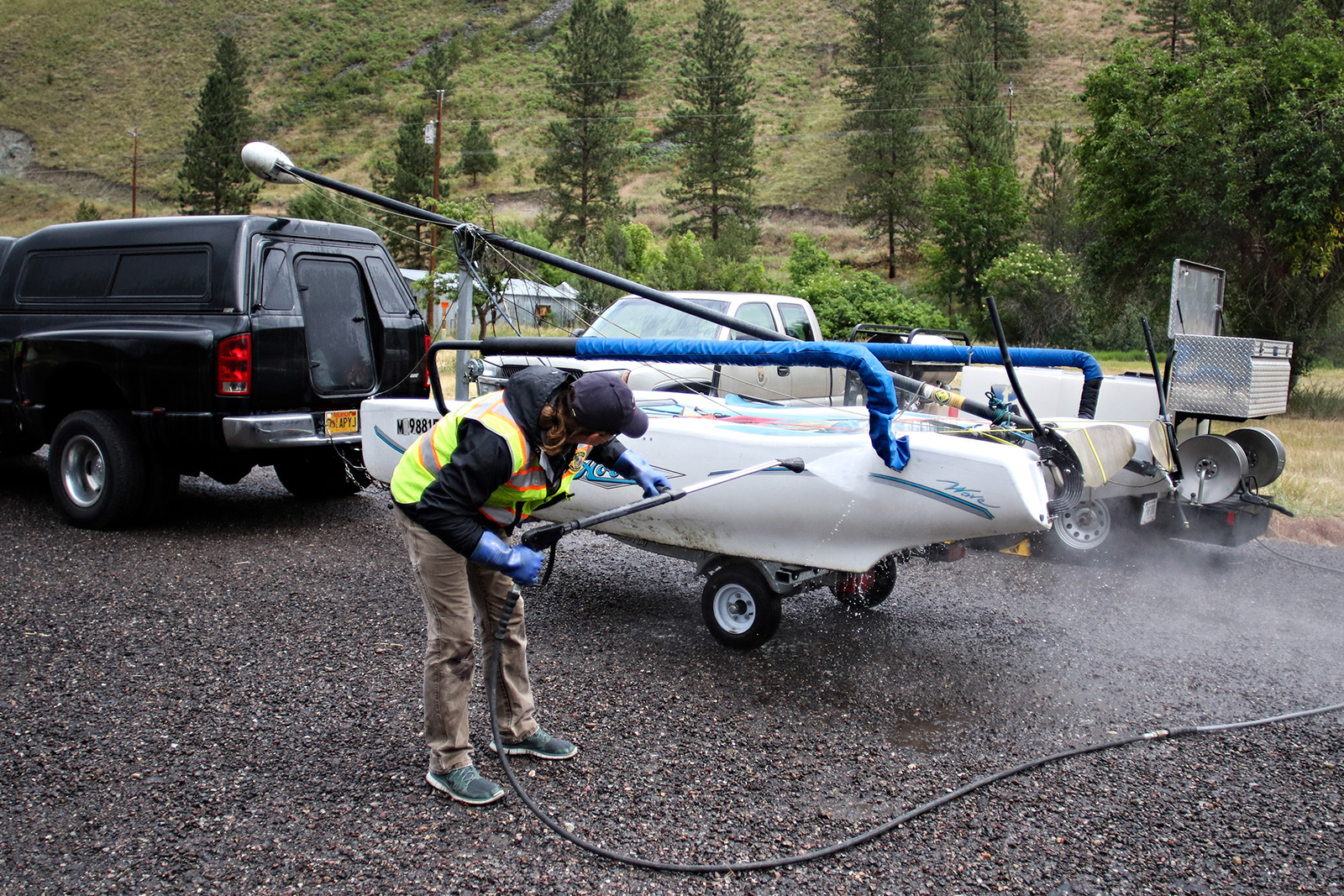On First Inspection Weekend in Montana, First ‘Mussel-fouled Boat’ Intercepted
The boat, a pontoon intercepted at the Anaconda inspection station, had not been in Montana waters
By KEILA SZPALLER, Daily Montanan
Inspectors detected and cleaned the first “mussel-fouled watercraft” of the season in Montana on Sunday at the Anaconda inspection station, Montana Fish, Wildlife and Parks announced Tuesday.
The boat, a pontoon, had not been in Montana waters, said FWP spokesperson Greg Lemon.
“It’s the first one of the year, and it’s always surprising to get one on the first weekend when the stations are open, but it’s a big reason why we’ve got these stations in place,” Lemon said.
After it was cleaned, workers locked the boat to its trailer to be sure it wouldn’t get in any water for a set amount of time, he said; he said inspectors at other stations can unlock it once it’s cleared.
FWP looks for different types of aquatic invasive species at the stations, not just zebra and quagga mussels, Lemon said. However, mussels can reproduce and spread rapidly, and they have the potential to damage irrigation and power systems and threaten recreation.
They have caused “substantial economic” damage in the Great Lakes area, according to a 2019 report from the Flathead Biological Station of the University of Montana. The report estimated the potential loss to private property values in Montana — not including irrigated farmland — to be as high as nearly $500 million if mussels were to infect all waterbodies.
Many invasive species have infected Montana waters, but so far, mussels have not, Lemon said. He said suspected mussel larvae were found in the Tiber Reservoir and Canyon Ferry Reservoir in 2016, but enough time has passed that those Missouri River Basin waterways are considered clear.
The Blackfeet Nation conducts inspections at four stations on the reservation, which is near Glacier National Park, and DeNeill Trombley said getting people to stop can be a challenge. She said law enforcement officers help when drivers skip the required stop.
Trombley, aquatic invasive species manager, said people from outside Montana sometimes think only motorized watercraft have to stop, but she said kayaks and paddleboards can be problematic too.
“They can drag up the plant life from different lakes and (AIS) hide in their nooks and crannies,” Trombley said.
Inspectors have found mussels on kayaks and paddleboards, she said, but not last year: “Last season on the reservation we lucked out, and we did not find any.”
The invasive species are a concern for Glacier National Park andYellowstone National Park as well. Yellowstone said last week it faces an increased risk of invasion following nearby detections including on the Snake River in 2023 near Twin Falls, Idaho, the first detection in the Columbia River Basin.
“Mussels have caused irreversible ecological damage and extensive impacts to infrastructure and recreation in waterways throughout the Midwestern and Eastern United States, as well as in the lower Colorado River Basin,” the park said in a news release. “In both 2022 and 2023, Yellowstone’s AIS inspectors intercepted and denied launch to mussel-fouled watercraft, highlighting the urgency and severity of the threat.”
On March 7, Yellowstone opened a 30-day public comment window on a plan for stopping the spread of AIS into park waters. People can see the plan and comment here: https://parkplanning.nps.gov/yellboats.
In the 2023 season, Montana conducted 95,298 inspections including of 19,534 boats that had launched in states with known infestations, according to a state AIS dashboard. Most out-of-state boats are from Idaho, Washington and Wyoming.
Travelers with boats, inflatable kayaks, paddleboards and all other watercraft are required to stop at the inspection stations, and Lemon said most people are good about stopping. Last year, he said inspectors found mussels on 51 boats.
The inspections are quick, he said, but he recommended people keep smaller watercraft, such as innertubes, easily accessible. He also reminded people to “clean, drain, dry.”
“It’s illegal to pass an inspection station when you have a watercraft and not stop,” Lemon said.
FWP’s enforcement summary online said a person can be cited for driving past an inspection station if they are hauling or carrying a watercraft. Learn more at fwp.mt.gov/conservation/aquatic-invasive-species.
This story originally appeared in the Daily Montanan, which can be found online at dailymontanan.com.